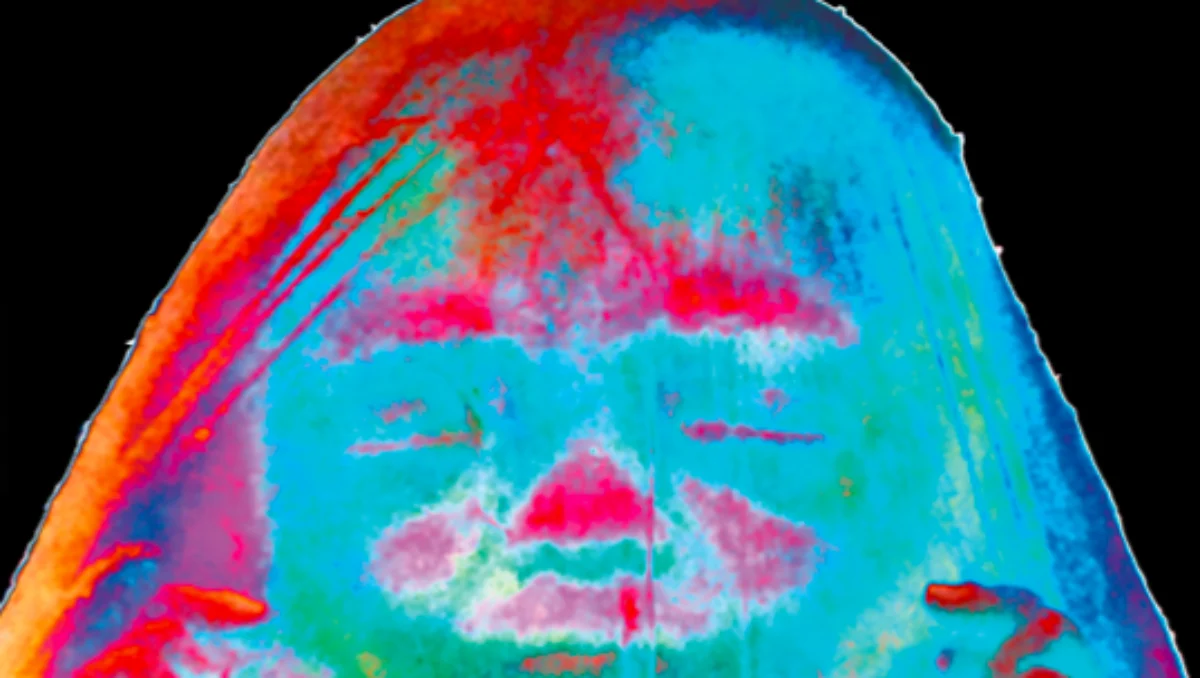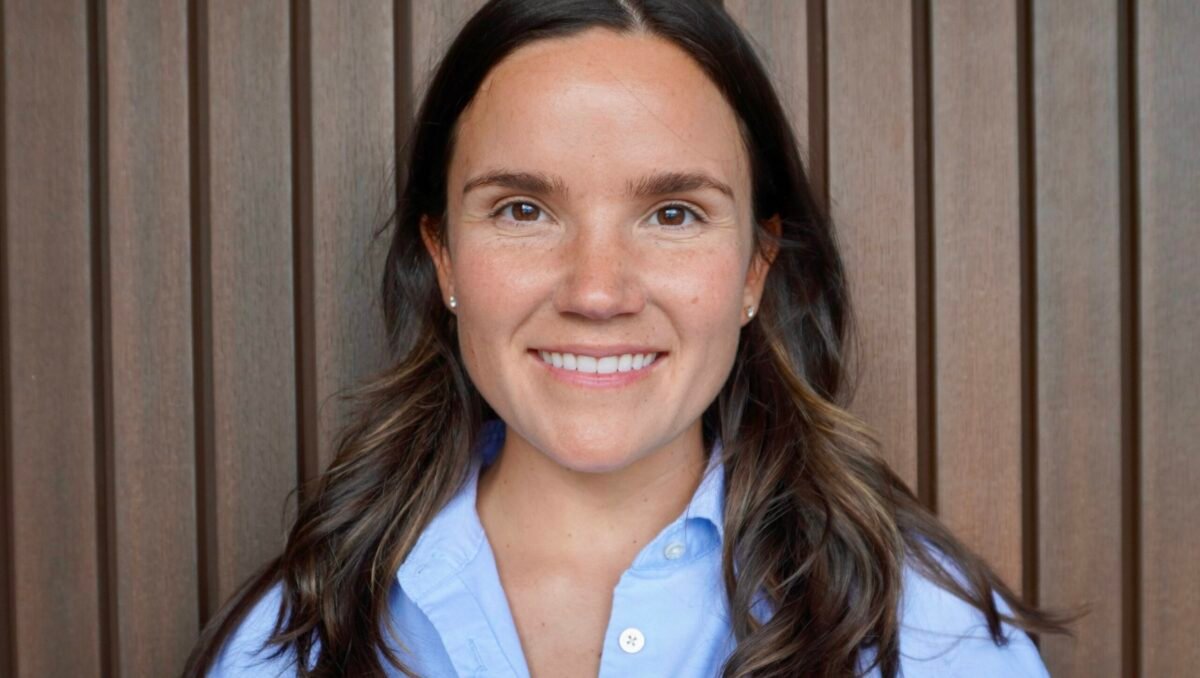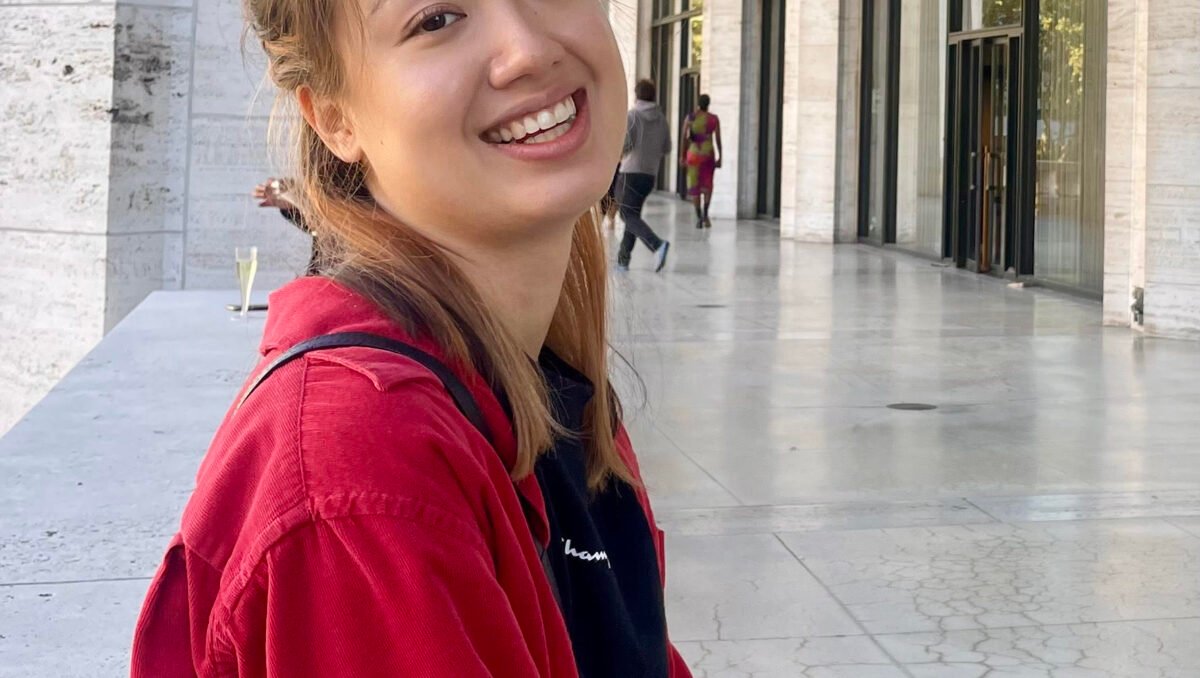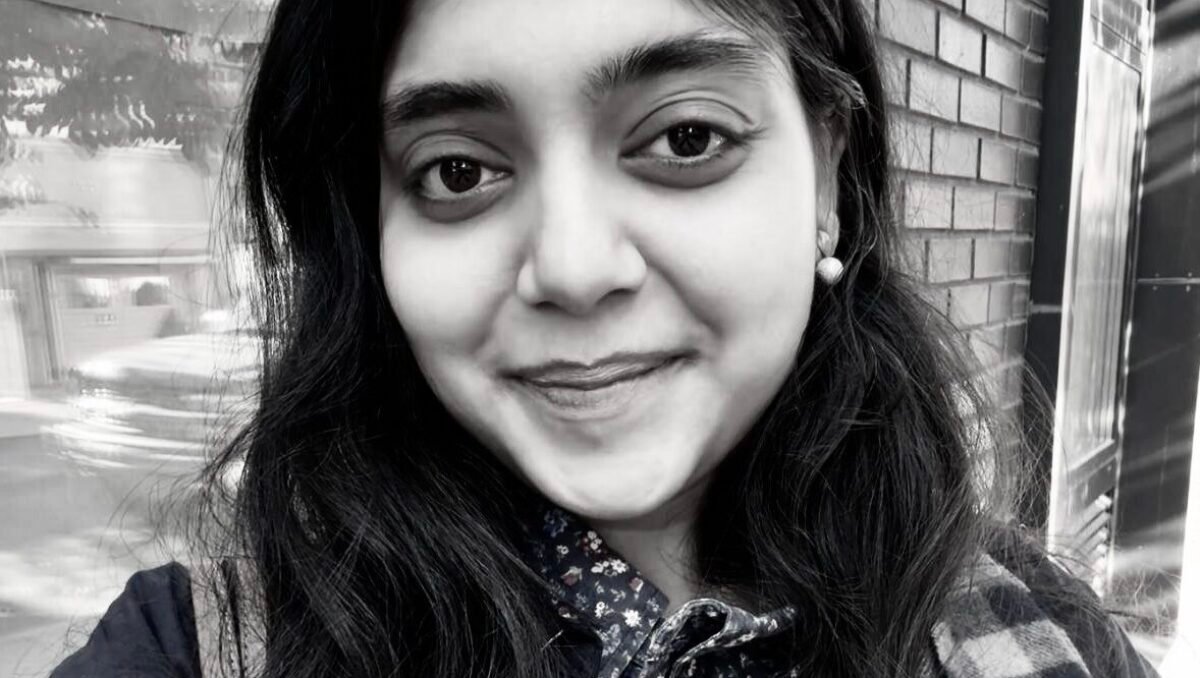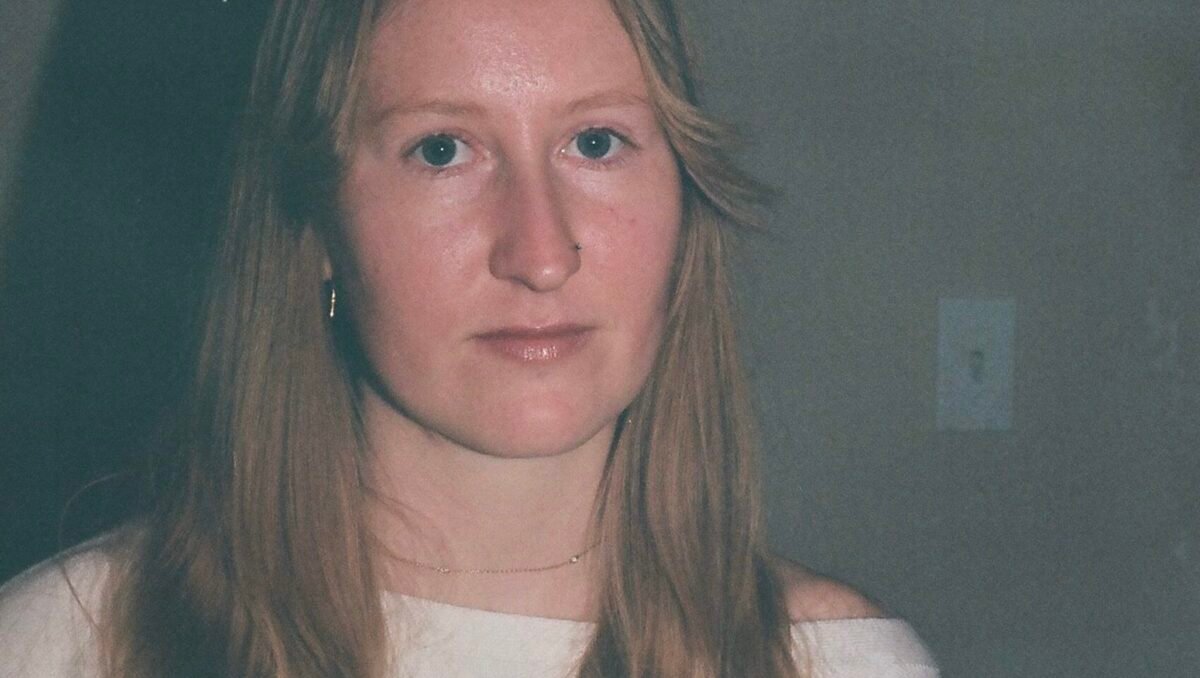OCTOBER INTERVIEW with EDWARD SALEM
Edward Salem is a poet who hasn’t lost his sense of humor. “Palestinians,” he shares in our interview, “are insanely funny.” It’s this sense of humor that jumps off the page of Salem’s debut poetry collection, Monk Fruit, surprising readers, even as he’s tackling topics like the occupation of Palestine, American imperialism, torture, and genocide. Salem will take you to Gaza—but you’re going to stop by the tchotchke bin at Burlington Coat Factory on the way. Described by its publisher, Nightboat Books, as “like Rumi on acid,” Monk Fruit speaks to the immediacy of our current moment while also taking a 250,000-year lens to humanity, inviting readers to interrogate their place in it all—even, perhaps, without losing optimism entirely.
Edward Salem is interviewed by E Ce Miller.
FWR: Monk fruit doesn’t actually appear in any of the poems in Monk Fruit. For those not familiar, monk fruits are these trellised, blossoming squash, native to East Asia, named for having been grown in monastery gardens for thousands of years; now they are more widely known as a trendy weight loss hack/artificial sweetener substitute. Am I reaching too hard for a metaphor here? What were you hoping to evoke with the title of the collection?
ES: Thank you for bringing in this context. There’s definitely something to that, the play of high and low, like Buddha on a coaster. And I like how playful it sounds, “monk fruit,” and how slippery the associations can become when you read the book through the lens of the title—I think it manages to hold a lot of different motifs together: children, spirituality, sexuality, corporeality. Poems as fruit of the psyche. It can also serve as a metareflection on myself as a poet dabbling in eastern philosophy, but in this way that is kind of impish or outré.
FWR: There are so many flying insects in this collection. Some are trapped, before facing violent, untimely ends: crushed, clapped to death. Bees are military drones, hornets are “cancer picked from [a] mother’s lungs.” A few seem to offer a touch of whimsy, like the flea who is stunned by a fluffy sweater. What’s up with all the flying insects?
ES: I just saw the new Superman movie, and there’s a scene where Superman flies to save a squirrel from a falling building, acknowledging the sanctity of its life. It’s fun to imagine how busy Superman would be if his mandate included insects.
FWR: The poem “Buddha’s Bad Meal”, which describes a bee trapped in a juice glass, reminded me of this Buddhist koan about a dragonfly caught in a spider’s web, which essentially asks whether an observer should intervene and free the dragonfly. The most earnest students, I think, incline toward freeing the dragonfly. But what of the spider’s hunger?
The narrator in your poem says, “It wouldn’t matter if I rescued the bee or let it drown.” There’s this question many of the poems in Monk Fruit seem to be asking: Does it really matter what we do to each other, and if it does matter, on what scale? Can you speak to this?
ES: I love this question, thank you. And thanks for sharing the koan. It reminds me of an inspiration for the poem, a scene from Luis Buñuel’s film Viridiana. A man sees an exhausted dog tied to a moving cart, being dragged along the road. Out of compassion, he buys the dog from the cart driver to save it from this cruel treatment. But immediately after this act of mercy, another cart passes by, dragging another dog behind it.
Years ago, when I was living in Beirut, before I had really contended with Buddhism and Vedanta, a friend suggested detachment as the only adequate response to the cruelty of the occupation of Palestine. He was speaking to this notion that engaging, in and of itself, perpetuates injustice. That only through stillness and detachment can one move anything. I can’t tell you how appalled I was by his stance, as if we should lie down while our people are tortured and killed. But, as it goes with certain Eastern spiritual traditions, it’s only through direct experience that you start to understand a perspective that first seemed so cold. I think now that my friend was trying to say—how did Ram Dass put it? Police create hippies and hippies create police.
Back to the question of scale, I remember in the early days of starting City of Asylum/Detroit, we were meeting with a possible investor and he was like, so how many exiled writers will you bring over every year? He was expecting the answer to be like 100 or at least 10. When we explained how complicated the visa process alone would be, and that our mission was to provide deep, multi-year support to one fellow at a time, he was deflated. And I get it. At this moment, we’re supporting two Palestinians from Gaza through our new fellowship in exile (largely buoyed by the boundless optimism and energy of my cofounder, Laura Kraftowitz).
At the same time, compared to the number of Palestinians experiencing genocide, helping two people feels like a drop in the bucket. I live in the contradiction that exists between my philosophical pessimism, exemplified by the drowning bee or the abused dog, and the life-affirming hope inherent to providing these fellowships.
FWR: “Give What You Can” is a poem I read over and over—the way it is written invites readers into this sort of breathless repetition. It made me self-aware of how I relate to the media I consume. The poem mimics scrolling through social media, putting language to the image-heavy sensory excess most of us have grown accustomed to. I wonder about the effects of, for example, viewing footage of ICE raids in the same 1:1 framed feed as a best friend’s new baby photos, of considering an image of an infant starving in Gaza immediately before a celebrity’s ad for green laundry detergent—it’s all sort of occupying the same brain space, all landing in the same frequency in the sympathetic nervous system…
A few poems later, we get “The Palestinian Chair”, with the line “…you realize that / You were there. / For all of it. / It was all you.” These two poems struck me as a sort of call and response. Technology facilitates a sense of “being there” for everything while also fostering a kind of dissociation from all of it. Do you have thoughts on this?
ES: I recently watched a clip—on social media, of course—where Arundhati Roy talked about how unnatural it is for us to take in all of this information. How we can’t hold it and shouldn’t expose ourselves to it all, how she thinks it’s making us spiritually sick. And I agree with that. But in a time of live-streamed genocide, you have to reconcile that with the moral failure of not looking, or rather, looking away from the images that Palestinians in Gaza are asking us to witness. This poem sort of documents the dizzying experience of watching a nightmare unfold, and also watching the direct action and creativity harnessed to resist it.
I almost hate to say it, but I think a collection of poetry is often sequenced to give the reader a parallel sort of whiplash. You don’t want a stretch of poems to blur into one another, so you keep the reader on their toes through juxtaposition, tone shifts, etc., in a way that somewhat resembles the deliberate scramble of the algorithm. But the key differential is that poetry sensitizes where the algo desensitizes. Poetry is kind of the anti-social media.
FWR: For all the intensity in this collection, there are lines and images that I also found funny, if wry. The poem “Tchotchke” features a chrome Ganesh bought from the clearance bin at Burlington Coat Factory. “Fasting for Gaza” includes the line “Jenny Craig should advertise with Al Jazeera.” What do you think irony has to say to reverence, levity to gravity? Will we be telling jokes at the end of the world?
ES: The book is dedicated to my late father, to whom I owe my fucked up sense of humor. He was deeply disgruntled, disdainful of what Zionism and American imperialism were doing to his country and its neighbors, and at the same time, he was hilarious. After dinner, he’d stand up and announce to the family that he was going to the bathroom “to pray,” and when he emerged, he’d stand in front of us and make the sign of the cross, pronouncing Latin-sounding gibberish, “dominos patros bibiscos,” cracking himself up every time.
Palestinians are insanely funny. It’s something that gets lost when we’re fighting for survival in a genocide, but gallows humor is intrinsic to our culture. Yasmin Zaher is hilarious, Adnan Barq is hilarious, Mohammed El-Kurd is hilarious, Randa Jarrar is hilarious. My sisters are hilarious. We’re a funny fucking people, but there’s a pressure on us to be earnest victims, to one-dimensionalize ourselves. I’m just trying to be myself—and I’m my father’s son—by making room in this book for the full expression of that.
FWR: In “L’Origine du Monde”, you write, “Surprise myself every time I begin / a new poem without Palestine, // though nothing is my other obsession,”. The omission of “I” before “surprise” made me wonder if these lines were a command or (and?) an expression of surprise on the narrator’s part.
When did you begin writing Monk Fruit? Could you discuss the process of writing this collection? How do you experience writing poetry, which is perhaps the antithesis of the “hot take” in the face of… [gestures at the world].
ES: I love this question, and your interpretation of the omission of “I” as a command. Can I say yes? I think the truth is more that I have a habit of starting poems with “I,” and on a purely intuitive level it felt right to lop it off. In writing Monk Fruit, I trusted my intuition, even and maybe especially when something felt like it might be wrong or risky or too demented in some way. I wrote it concurrently with a second book, Intifadas, out this spring, which is more grounded. I mean, it’s still demented, but with Monk Fruit, I really followed that energy to work out my obsessions and excavate the weird, profane images living in me, without holding the reins too tightly on how they show up on the page.
FWR: Does your work with City of Asylum/Detroit inform your poetry, and vice versa?
ES: Naji al-Ali, the Palestinian political cartoonist who created Handala and who was assassinated because of his art, was one of my first and primary artistic heroes, especially in my formative years as an artist. Geoffrey Rush’s portrayal of the Marquis de Sade’s imprisonment in the film Quills also left a deep impression on me. His anguish, his defiance, how he fell apart, and how he smuggled his manuscript out—not unlike the Palestinian prisoner Wisam Rafeedie’s The Trinity of Fundamentals.
In another life, I was an artist. When I lived for a while in Ramallah, my family was always worried because I was making provocative performance art in public spaces. Of course, in Ramallah, the Palestinian Authority was the one to worry about, since they were the enforcers of Israel’s efforts to quell dissent. They arrested me once. Even for innocuous gestures, like a performance where I threw pillows over the Apartheid Wall, I had to have lookouts watching my back. But now I live in the US, and there is, at least for now, still a level of safety.
A friend from Mexico recently described living in the US as hiding behind a bully for protection. And my work at City of Asylum reminds me not to take that position lightly.
FWR: I want to end by asking if you have an answer to the question “Barbecue” posed:
“250,000 years after / the discovery of fire, / we still ate raw meat. / But good things come
to those who wait. // It took us a quarter / of a million years / to arrive at barbecue, / so give God a little / more time.”
Those of us who don’t have a quarter of a million years, which is to say all of us, how might we better fill our waiting? Or, perhaps, that is the wrong question—maybe it is in the constant, desperate filling that we are getting ourselves and each other in trouble? What do you think?
ES: At the risk of sounding like an optimist, I’m not sure we’ll have to wait that long. Demis Hassabis, the child prodigy who now runs DeepMind and who has spent his life researching artificial intelligence, puts our chances of creating AGI [Artificial General Intelligence] by 2030 at 50%. Other researchers and thinkers I’ve long followed in this space are similarly optimistic. Hassabis won a Nobel prize for his work using AI to fold proteins, which will likely be involved if we’re ever able to cure cancer. I wonder about a super-intelligent entity that could eradicate social illnesses like Zionism and capitalism while heralding in universal abundance. I do worry that the technology is coming faster than we can prepare for it, but I’m also trying to hold a bit of hope for the vast good it could do.
I really hate to say it, but no form of resistance so far—neither violent, nonviolent, nor symbolic, certainly not poetry or speaking out on social media—none of it has stopped the ever-escalating genocide in Gaza. I’m not saying we should stop resisting, just the opposite. But I do wonder, and I’m the first to admit this does sound fantastical and maybe a little escapist, but if we merged with AI, could there be a paradigm shift toward empathy and compassion? I know it’s de rigueur to believe the opposite, that the techno-feudalists are tightening their grip as we move deeper into fascism. But nothing else is working the way we need it to. Despite our best efforts, we’re still failing the people in Gaza, Sudan, Yemen, Afghanistan, Haiti, to say nothing of the eighty billion land animals we murder annually for food. Whatever the case, it seems likely that humans will evolve by merging with AI and technology. Monk Fruit deals a lot with the Big Bang, the origin of the universe and the nature of reality. I love thinking of the distant past, and the far future.
- Published in Featured Poetry, home, Interview, Poetry
SEPTEMBER INTERVIEW with LIZA HUDOCK
Addiction, death, and loss are everywhere in Liza Hudock’s debut collection, Reveille (released by Flood Editions in August), but they are not its actual subject. Instead, the poems wrestle—as near as it can be stated—with the world the speaker inhabits. Whether she turns her attention to a moth, the comparison between a pumpkin and a sonnet, Renaissance art, or a spoon, Hudock’s syntax and images are as surprising as they are breathtaking in their clarity and freshness as she explores, among other things, what it means to give care to people and places that may not be able to be healed.
FWR: I wonder if you could start by talking about the title of your book, which is the title of one of the later poems in the collection—how did you choose the title, or how did it choose itself?
LH: On military bases (and at summer camps, if the movies are true) reveille is the bugle call played at 7 am, usually as a recording over a PA system (it comes from the French command réveillez-vous; wake up). I either heard or pressed play on “reveille” almost every day that I was in the Coast Guard, and that experience did bring the word to my vocabulary, but it isn’t why I chose the title. My youngest sister used to throw water at the sparrows who lived in the bushes near our house when their chatter annoyed her. They hadn’t bothered me before, but I noticed them a lot more after she died. One morning, I picked up the copper pot she used to use for water throwing and I just brandished it in the birds’ direction, and they fell silent.
A few months later, I heard a concerto for choir by Georgy Sviridov called “Pushkin’s Garland”. One of the movements is called “Reveille.” The lyrics for this movement are taken from a Pushkin poem called “The Dawn is Struck.” I liked the figure of dawn as shorthand for the bell that is struck at dawn. I imagined the way a beam of light strikes a brass bell and the way that brightness has the sudden intensity of a bugle blast. So, this “Reveille” felt connected to the silence that rung out from my copper pot that day. That’s how I titled the poem. And then, it was just clear that it should be the title of the book.
Reveille does a lot of lamentation for my mother and sister, but I hope it feels full of possibility, like a new day—and by possibility, I don’t necessarily mean optimism; you can wake up full of fear, but certainty that the day must be different from the one before can be enough.
FWR: Let’s talk about influence. You mention Whitman, Stevens, Dante and Genesis in the book. Who would you say are your most important literary and/or artistic influences?
LH: Christine Kitano gave a lecture on poetic lineage while we were working on our MFAs—I’m sure you remember it, and I recommend it to everyone. That lecture is the foundation of my understanding of poetic influence and the reason I was able to find a voice for these poems. Basically, it’s okay that the pantheon of poets living in my heart is not upheld by any single school or tradition. I am the connective tissue. Part of my struggle starting out was that I felt like I was writing from nowhere and I needed to locate my voice somewhere in order to begin. My poetic lineage, which I didn’t realize I had built through years of reading until Christine talked about the fact that it was a thing, gave me the origin point I was missing. And, also, the lineage changes with me: Zbigniew Herbert, Wanda Coleman, Marianne Moore, Francis Bacon… I lived with them during those years. Before that, I read everything Pevear and Volokhonsky have translated from Russian. Lately, it’s been Dionne Brand and Fanny Howe. I’ve been reading The Faerie Queene almost every day… I don’t know why.
FWR: I’d also like to discuss visual influences and elements in your work. There are two ekphrastic poems in the collection: “After Mantegna’s Lamentation of Christ” and the gorgeous “After the Gold Leaves from Pelinna,” as well as a few other poems that describe or look at religious icons; your visual imagery is precise and stunning throughout the collection. (In the “Mantegna” poem, for instance, I love seeing the “whorled lake/ like a marble slab” and “the pads of [Christ’s] washed feet,/ torn skin like a gull’s/ wings in flight.”) Indeed, one of the hallmarks of this collection is your command of simile, image, and extended metaphor. I’m quite shy of similes in my own work because it’s so easy to write a hamfisted simile, and so hard to write one that really surprises and changes one’s way of seeing. But you jump right in, and after looking at them over and over again, I think they work because they are, when taken all together, intelligible, surprising, and mysterious—even when you work with an extended metaphor you’ll finish with a turn to something that resonates and opens up meaning without fixing it and snapping the poem and its meanings shut.
I think here, for instance, of “My Dead Folks Know They’re Dead.” In the wake of her losses, the speaker acknowledges a freedom that “Like a tulip/ […] comes fastened/ to the buried fist that feeds it, or the leaf/ that nourishes the fist.” At the end of the poem the speaker turns to her own “Mind// worming away at things, certain only/ of the first thing I said. The way/ I know the hard bulb by its tulip.” I’m still mulling all of the possibilities in these comparisons!
I want to ask, “how the heck do you do it?” but I suspect the answer is that it’s just how your brain works! So instead I’ll ask, is this a conscious process? Does it grow out of your precise observations of the natural and human worlds, or do you begin with the idea or state that you’re comparing to the vehicle you write about?
LH: My process grew from reading Brigit Pegeen Kelly’s poem, “Closing Time; Iskandariya.” It was the most perfect example of description I had read to that point and therefore one of the best poems I had ever read. I decided that if I could just look at whatever was in front of me and describe it, the words that came would be enough for a poem.
I wondered if the urgency of Reveille was a little unhealthy, by the way. It would have been appropriate for me to take a break from writing and then come back to the book about the year my mom and sister died with a measure of artistic distance. But you know Nietzsche’s famous sentence: “And if you look long enough into the abyss, the abyss will look into you,” right? I recently discovered the sentence that precedes it: “Whoever fights monsters should see to it that in the process he does not become a monster.” That’s exactly what was happening to me. I was bitter, treating life like a joke. Something compelled me to work on my descriptions every day, and that practice preserved whatever cooling coal of tenderness I had left for the future. So, the intention to describe was conscious. Figuration is the natural result of the effort to describe. I have an aversion to all that “like” too, but I did it anyway. Fortunately, my process has changed. Figuration is still there, but more vaporous.
FWR: I’m curious about how you think about craft, in part because we attended the same MFA program and studied with some of the same poets (though our aesthetics and approach are quite disparate—which is one of the reasons why I always love to talk about poetry with you!). What formal and structural elements do you particularly pay attention to in your poems, and is form something that you think about early in the composition process or that you arrive at when the poem starts to find its way?
LH: I don’t know about you, but I absolutely needed to learn craft. Getting an education didn’t ruin anything for me, if that’s what you mean. The wildness and the mysteries are still here. I think of structure in terms of syntax, and I do cast and recast a poem in different syntaxes until it feels right. Form, as in the shape of the poem on the page, is usually the last thing figured out. I will begin with such a clear vision of a prose block, and then it turns out the poem was destined to be long and skinny, for example. I handwrite until the words of a poem are pretty much settled and then send it through all kinds of forms once it’s on a screen. This can take years, but it seems a matter of dignity to find the shape a poem is waiting for.
FWR: Could you walk me through your process in a particular poem where the form went through this kind of evolution?
LH: Yes: for example, the first draft of “Funeral for a Cook” existed for a few months as just this short note. I printed it out on its own sheet of paper feeling that it might become a poem. A few more notes, and suddenly I was cramming the words in as a prose block to make it fit on one page. Once I re-typed the poem, I didn’t save the many formal variations it went through, but I can describe a couple. This poem is a loving gesture with a volta towards the end, so I tried typing it as a sonnet, but that wasn’t right. My favorite sonnets appear to discover themselves as they unfold; they feel surprised by their own turns. “Funeral for a Cook” seems to know its ending from the first word. The poem just wants the reader to trust it enough to follow.
Next, I noticed a couple strings of iambs that worked well as short lines, so I tried to type the whole poem in 3- to 4-beat lines and favored end rhyme where I could. In this form, most of the short lines cut against the syntax too much. I didn’t need the added tension between line break and syntax in a poem whose proposition was already so tenuous. It turned out to be a very willful, line-driven poem. The lines work like rungs on a ladder, allowing the speaker to advance her desperate imperative with a strange sure-footedness. Generally, if a line isn’t end-stopped with a period, it breaks at the end of a clause or otherwise natural breathing place. So, once I let each line defend itself as well as possible and allowed stanzas to group thoughts in a way that only strengthened the poem’s rhetoric, I landed on the shape that now feels inevitable.
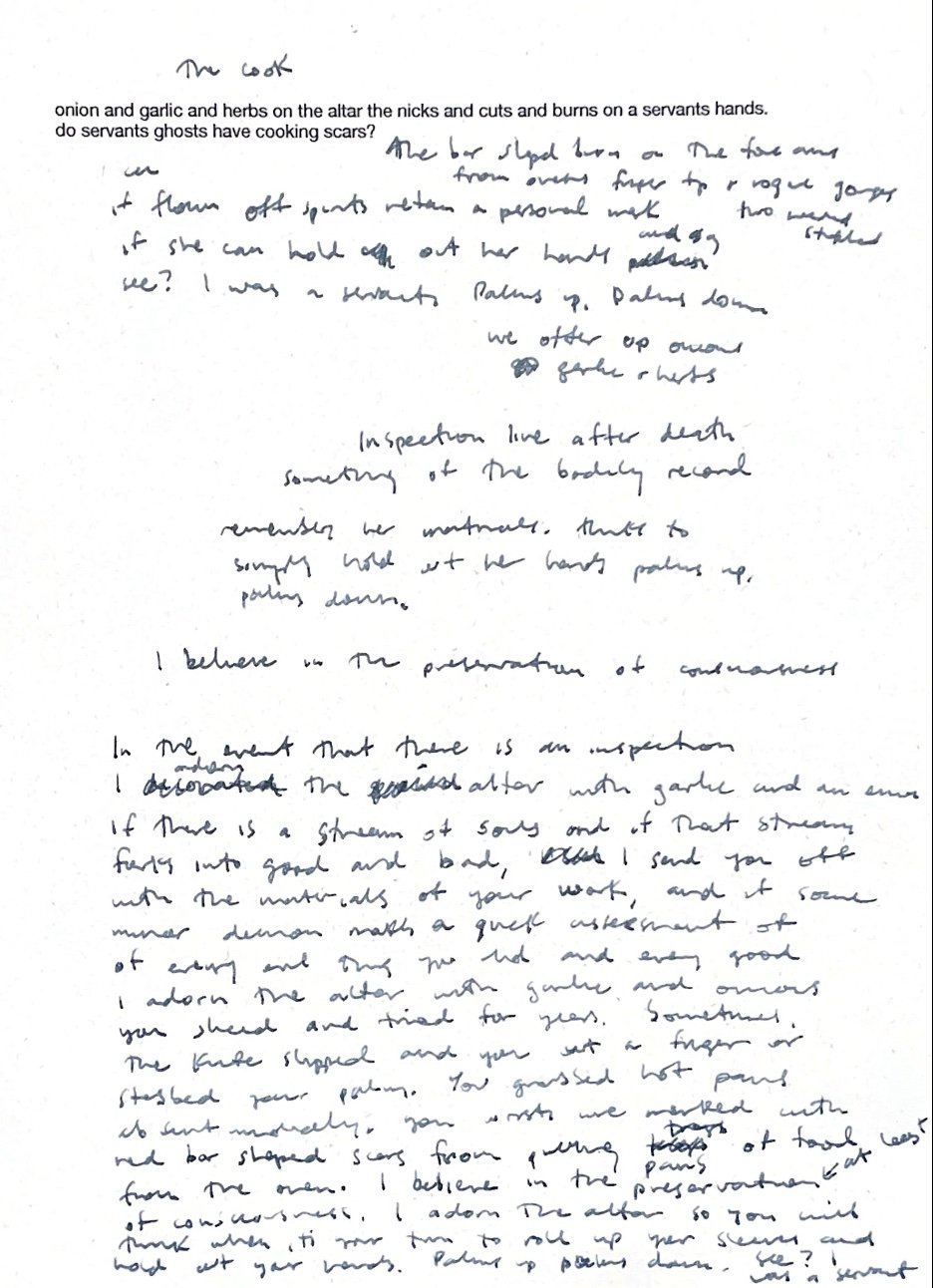
FUNERAL FOR A COOK
In the event you come up for inspection,
I lay the altar with garlic and an onion.
If there is a stream of souls that forks into good and bad,
I send you to it with the materials of your work.
In case some minor demon makes a quick assessment
of all your evil deeds against the good,
I lay the altar with the garlic and onions you sliced and fried.
Sometimes the knife slipped.
You cut your fingers and stabbed your palms.
You grabbed hot pans daydreaming,
your wrists were lined with red scars
from the oven’s opening.
I want to believe in the preservation of consciousness.
I lay the altar so you might think,
if you are ever to be judged, to roll up your sleeves.
Hold your hands out and I promise never to tell you
what to do again.
Hold your hands out. Palms up, palms down:
see? I was a servant.
FWR: I’m fascinated by all of this, especially the way you noticed what wasn’t working about each form even as you recognized the impulse that drove that version. And, for the record, going back to your previous answer: yes—I absolutely did need to learn craft too! I had read and written a lot before the program, but I kind of rebuilt my understanding of poetry, both as a reader and a writer, from the ground up. Which brings me to where you are now: what is your writing routine like; what does your writing (and/or revision) process look like for you, and has it changed since completing this book?
LH: I don’t have a routine as far as time of day or length of time. I do tend to work in batches. I’ll have several poems laying out like wet canvases and sometimes I spend hours with them, sometimes I just make a change to one on my way to something else. The process of writing Reveille doesn’t seem repeatable. It took place in stages. At first, my sister and I were sleeping every other day, tending to our mom constantly. We did her hospice at home. I wrote down an image if I could and just promised myself to get back to it. Our youngest sister died eight months after our mother. So, Reveille dwelt amongst cortisol and insomnia and grief. I sensed the window to write it was going to be brief, and it was.
FWR: How long did it take to write the book? Are you working on anything now, and, if so, does it speak to Reveille in any particular way?
LH: I wrote most of it in 6 months and revised for another 6 months, but this fruitful year came after 2 years of… maybe a different kind of fruit. Just learning. The poems I’m working on now are less narrative, less sequential. More imaginary. An image and a phrase will arrive as a pair and I find out how they know each other. Some of their forms are new to me, too. The Reveille years had a theme color and it was yellow—even though yellow is a happy color and that was a sorrowful time.
Now, I’m rejoicing, I have a baby, and the prevailing color of the poems is purple. I think purple and see a forbidden forest. I was puzzling over this last spring and noticed that for a few weeks, there were just dandelions in the grass, then violets appeared among the dandelions. It’s just the natural sequence. One follows the other, they go together. So, maybe the connection between my yellow and purple poems is as simple as that.
SEPTEMBER INTERVIEW with Julia Thacker
Julia Thacker’s debut collection To Wildness was recently awarded the Anthony Hecht prize by Paul Muldoon. The book makes its way through the wilds of New England, grieving the family born and buried there. To Wildness is enamored with the world of sense, yet lingers close to the realm of the dead. It is elegiac, yet fiercely vital, prizes holiness as much as irreverence. It brings all of these loves to life through exacting, brilliant language.
Julia Thacker was published in Issue 26 of Four Way Review and is interviewed here by Amery Smith.
FWR: To start – To Wildness is your first book, but it’s also (as you mention in an essay you wrote for Women Writers, Women’s Books) the first sustained bit of poetry writing you’ve done since grad school. What do you think you learned about yourself as a poet after finishing the book, and returning to poetry after so long? What differences (craft, writing philosophy, etc.) have you noticed between “MFA Julia” and “To Wildness Julia”?
JT: My return to poetry was entirely intuitive. The desire to reengage with the genre simply came over me like a fever. What became clear to me at the outset was that as a mature person, I had access to a voice with more tonal range. As a young writer, I’d recognized that my poems, though well-written, were stilted by what I’ll call their “high seriousness.” Then and now, I admired the work of Denis Johnson, especially his collection The Incognito Lounge, which moves from a high register to the vernacular, from ironic to lyric to self-effacing in the course of a single poem. While few of us will ever hit those heights, as an older writer, I have access to a fluidity and range of tone I didn’t possess during my first go-round as a poet.
Completing this collection also confirmed for me that I am a miniaturist. For years, I wrote and published short stories in journals and magazines, and tried many times to weave these pieces into a full-length novel. When I picked up poetry again, I vowed not to quit until I’d published this book. Bringing To Wildness to fruition taught me I’m best suited to the short form across genre, and I’m fine with that. I learned to be true to myself.
FWR: When you say that “as an older writer, I have access to a fluidity and range of tone I didn’t possess during my first go-round as a poet,” what specifically about getting older do you feel gave you that tonal range?
JT: When I was young, I considered poetry the highest form of literature. I was intimidated by the genre. My early poems don’t reflect the wit and humor present in spoken language. Now, with a wide range of experiences behind me, I’m more at ease in juxtaposing lyric with the vernacular.
FWR: I wanted to ask you about To Wildness’s structure. Paul Muldoon praises the book’s four-part structure for its range, both thematic and formal. How did that structure emerge? What did you feel like the poems were telling you about how they wanted to be ordered?
JT: Indeed, as you suggest, I did listen to what the poems were telling me about how they wanted to be ordered. They are often smarter than I am, and I follow their lead. Most of the pieces in the first section were written early in the composition of the manuscript. They’re foundational. They establish the world of the book, its subject matter and elegiac stance. And in these initial pages I wanted a variety of styles and forms, a sense of surprise from poem to poem.
My work is dense with imagery. The Roman numerals announcing each of the four sections offer a pause, breathing room, the calm of white space. My hope is that each section stands as a unit with a distinct narrative and emotional arc. Part II is a six-page sequence in the guise of “notes” in fragments, each with a parenthetical title. The sequence depicts a mother/daughter relationship over a lifetime, but the chronology is fractured. The elliptical nature of this piece required a section of its own.
Part III of To Wildness further interrogates their themes and formal experiments in the previous two. Here, for instance, are what I call the “backwards” poems, with hard right hand margins and ragged left hand margins such that the lines seem to be floating on the page. Part IV is noisy with ghosts. Often referenced in previous sections, they come alive in this final suite, as though they’d been conjured.
To Wildness opens as the speaker is in late middle age. In the final poem of the book, she is a young woman living on Outer Cape Cod, a spit of land at the edge of an ocean, learning to be an artist. Over the course of the book, time is collapsed and fluid.
FWR: I think one powerful example of the many dichotomies To Wildness bridges lies in “Soul Wears a Crown of Milk Thistle”. We usually consider the soul to be the body’s direct opposite, separate from all the goods and bads we associate with embodiment. In “Soul Wears…Thistle,” though, the soul romps up and down the coast, isn’t afraid to get intimate or “vulgar” (“Washes her unmentionables / at the sink. Bleaches her mustache” and “swims in her drawers”), and — paradoxically — even has a body of its own (“Sand makes a dune of her body”). What led you to think about the soul in ways like this, in both this poem and in others throughout the book?
JT: I was brought up in the Southern Baptist church. My grandfather was a preacher whose dramatic and beautifully delivered sermons were something to behold. I am a secular humanist. And while I don’t subscribe to his system of belief, I am quite attached to the trappings of my childhood: the language of the King James Bible, the hymns, the paper fans decorated with reproductions of Biblical scenes and stapled to Popsicle sticks. The speaker in my poem “Doxology” declares “I am my own God, my own high priestess./Mine own book of timothy./… Protector of sayeth, goeth. It came to pass.”
My family was religious, but far from sanctimonious. They were hysterically funny. My mother, upon being promised she would one day take leave of her corporeal shell and ascend to Heaven in new form, a celestial body, said, “Well, I hope it’s a long, skinny one.” As for me, rather than thinking of the soul as a spiritual essence which requires redemption, I imagine her as independent and not at all well-behaved. In “Soul Wears…Thistle” she is free from the constraints of doctrine and social mores, free from the person to whom she is assigned. She lives as she pleases. I celebrate this world, this moment. What is more holy than wading in cranberry bogs or eating tomatoes off the vine?
FWR: The book switches effortlessly between prose and lineated poems, yet both succeed in using language spare and precise enough to close around the concrete or tangible. What do you think is the relationship between To Wildness’s prose poems and the other poems? What has writing prose poems taught you about line poems, and vice versa?
JT: Without lineation, a prose poem depends upon the sentence, its syntax, diction, rhythm and richness of language. There are writers I respect who don’t believe there is such a thing as a prose poem! I disagree. I’ve always been fascinated by that hybrid animal. One of my favorites is “Lavender Window Panes and White Curtains” by Juan Ramon Jimenez which I first read in a translation by Robert Bly. Here, metaphor, imagery and nuance are embedded in a tapestry of language which announces itself as a poem rather than a prose piece:
“I have been planting that heart for you in the ground beneath the magnolias that the panes reflect, so that each April the pink and white flowers and their odor will surprise the simple puritan women with their plain clothes, their noble look, and their pale gold hair, coming back at evening, quietly returning to their homes here in those calm spring hours that have made them homesick for earth.” *
I enjoy the challenge of varying the shape and form of my poems which are otherwise cohesive in their preoccupations and voice. In To Wildness, there are poems in couplets, tercets, sequences, lineated stanzas and of course the prose poems. Though they appear in various forms, they are all image-driven and in conversation with one another.
I don’t know that prose taught me much about writing poetry except perhaps how to sketch a character in a few strokes. Poetry, however, has informed my prose quite a bit in its particular use of language, concision and resonant detail. My story, “The Funeral of the Man Who Wasn’t Dead Yet” (AGNI 51), for instance, is image-driven and compressed with an attention to musicality.
*Selected Poems: Lorca and Jimenez, Chosen and Translated by Robert Bly (Beacon Press, 1973)
FWR: I also wanted to explore how To Wildness thinks about ghosts, especially as connected to grief. Mirroring how the book writes about the soul, To Wildness’s ghosts are surprisingly tangible. The ghosts populating the book’s final section find joy in working with their hands. They yearn for the fruits of the earth, and even taste them (“Aubade”) — in ways that mirror first-section poems where the living also do these things. I’ve pulled some lines from the first and fourth sections as a comparison:
To be elbow-deep in a barrel,
arms gloved crimson,
to make of simple labor
prayer…
……
Today we must work
with our hands until they are
no longer hands…
(excerpt from the poem “Plum Jam”)
Ribbed squash, king-pumpkin with its thick curling
stalk. Persimmons, verily orange and magenta, the weights
of sunsets in my hand. Egg-shaped plums shivering
on the conveyer belt.
….
Let me touch them as they pass.
Let me sweep up the shadows
of my boot prints and store them in a locked box.
(excerpt from the poem “Bag Boy Works Harder Now That He’s a Ghost ”)
What drew you to this way of thinking about the dead? Do you feel like it’s opened up new ways of thinking about (or even processing) grief?
JT: The way I think of the dead goes back to what my kin would call “my raising.” My family has deep roots in Harlan County, Kentucky. And they’re all great story tellers. My mother was raised in a series of coal mining camps, where my grandfather, Roscoe Douglas, was a crew foreman, and later a Baptist preacher. For them, life was precarious and death not uncommon. My great uncle Andrew, my grandfather’s beloved younger brother, was killed in a mine accident at 17. But even thirty years later, when I was a child, Andrew was constantly invoked, his movie idol looks, musical talent, the story of how after the slate fall that killed him, their sister went running through the camp to tell my grandfather before someone else got to him. Then she heard his voice a distance down the tram road and thought, “Well, Roscoe’s singing,” But as he got closer, she realized he was sobbing, and she couldn’t stand it, She hid behind a tree and stopped up her ears. That scene is as vivid to me as memory. My grandparents had eight daughters. One was stillborn. Another died of influenza as a toddler. Yet my grandmother always responded “eight” when asked how many children she had. Their names and the particulars around their losses were told and retold to us. My baby aunts. In the Upper South, Memorial Day is called Decoration Day when we carried picnic baskets, blankets to spread on the ground, and armloads and armloads of flowers to spruce up the family headstones.
In that culture, you might say the dead exist alongside the living. Storytelling is an act of devotion which allows us to process grief.
To Wildness contains so many references to ghosts that by the fourth and final section, it felt only right to embody them in all their eccentricities and desires, to give them voice. Some are benevolent and protective. Others are capricious troublemakers, like members of any extended family.
- Published in Featured Poetry, home, Interview, Monthly, Poetry
THE BABIES by Dara Yen Elerath
I am watching the babies. The gray one in sticky pants who keeps picking his nose. The pale one with headlice, scabies and fleas. I am watching the babies. This one choking on a plastic bottle. This one talking to itself in the dark. I am hauling the babies to the park, to the library, to the pool. The orange-hued baby is dirty and plays with crayons. The makeshift baby is taped together like a cardboard box. Where did these odd babies come from? Why are they languid and dull—limp in their cradles as loaves of bread? Why do I find them now in the garbage, now in the fork drawer, now in the kitchen sink? I grab a pink one crawling from between my thighs. I clutch a yellow one suckling upon my breasts. I find one hanging from branches like a piece of fruit. This one I dug from the dirt like a vegetable freckled with roothairs and worms. I gather the babies and turn them over, looking for the maker’s mark, but find no scrawl, no autograph, no trace of when or how these babies were made. I try to abandon them, but they come crawling after. I put them in a hamper, but they clamber out and grab my hair. These babies are my babies. I take them everywhere. This one carries my kneecap. This one carries my thigh. This one carries my heart.
- Published in Featured Poetry, Issue 33, Poetry
YESTERDAY AUSTIN TOLD ME TWO SWANS by Arro Mandell
drowned a local man
for coming too close and
Thomas and I laughed but
I still think if I don’t count my teeth
they’ll be taken, can’t
be careful enough out here.
Last night I stepped onto a
stage heaped with dead
fish. I was looking for the right
earrings and late to tea. An
army approached but
I couldn’t quite remember
to remember. Downstage
trenches crept closer and closer
to the cafe. The man with the sword
hoped to take my life. Twenty-six
teeth. More than I
started with but less than
I once had. Am I missing
something? The skirt of my blue
dress was just a little too tight
for me to throw punches
but I wasn’t worried–
the tea was so good
and so warm. The fish
stank and I didn’t notice.
That night my lover had made us
a bed in the open window so we
could sleep listening to the rain.
My days hemorrhage;
I can barely recall what
I’ve done with them.
Yesterday Thomas told us he
almost lost his hands
in a freight elevator and
afterwards looked at them
all day astounded and now
doesn’t think of them
anymore without getting
a little sick. Last night I woke
horrified at the war, at my body
pale as the fish, and stared
at the shadows of houses the gleams
of wet bushes the drunk trees and reached
for my lover’s sleeping hands.
I’d known them a couple
days didn’t want them
to cover any of my
confusions, didn’t need
to borrow a future from them.
They would kiss both my cheeks
quick and I liked to look at their eyes
the little chip in their left iris where the blue
dripped into the whites. I looked
as long as I could in the dim
morning with no sun and
no wind but they were already driving
cities away leaving me stunned
at what I didn’t have
and hadn’t known to want.
- Published in Featured Poetry, Issue 33, Poetry
PASSTHROUGH by Haley Lee
After the play we talk while
we wait for the C with our shoes
touching on the platform. Say,
when the magician unrolled
the sea, an old tunnel in us
burst open. Lights off, all
air – with you I believe
in water wrung from paper.
They didn’t need to use names
to make us understand the whole
premise is being alone at the
end. Can I say, I like when
the train gets stuck. For a click,
time stops dying in us. And
at the end, we only want to
go again. Against the current:
delay my breath.
- Published in Featured Poetry, Issue 33, Poetry
GOLD by Kunjana Parashar
Lately, I’ve been yearning for things: car keys,
houseplants, dhurries, cubes of ice, petals,
but really for something skin-deep. I keep
addressing myself as we; like I am the bull
& I am the matador. I am the prayer and
the devotee. We are prying open our mouths
to sing. We are the ear and we are the song.
We are two rundown radios talking
in a frequency none of us knows
how to reach, let alone emit our rightful sounds.
I’m trying to be someone other than me.
I’m trying to be the woman who shucks
oysters clean. Dredges them from
the depths of the sea with her bare teeth.
I’m trying to be her gold tooth, her
one and only, mended with the light
of the auric sun. Changing the form
of what’s obscene in me. Filigreeing
my fucking bones. All the crops
of all the lands genuflecting
to the bright brag of me.
- Published in Featured Poetry, Issue 33, Poetry
BLUE PERIOD by James O’Leary
It’s 9:31 PM where the end
of the city tinges the sea. An empty
spiderweb hangs motionless between
the blinds & the closed window leaking
the street’s neon onto the unmade bed. No
moon. Not even the comfort of wine,
bottles shaped like the body I want,
& will never have. I keep thinking about
the group of boys I passed huddled
around their broken car like priests over
an altar. I want to drink, to forget;
it makes the fashion of my sadness
tolerable. Driving on the highway, city
-fluxed, sober, trying to ignore my engine
light, my mind’s tidal drift reminds me
I never made it to my childhood
best friend’s funeral. Avoided it,
so I didn’t have to see his family,
the sharp angles of his still face. The radio
asks where the joy has gone; I try
to find it, I do, admire clouds, make food
for the people I claim to love. & the difference
between a claim & a lie is my hands,
their learned fluency in devotion
under the passage of each spent moon.
& the difference between the end of the sea
& the start of the sea, is how I feel
when I open the window & listen
to the pages of the water turn. Tonight
the sky tastes like ozone & time—I buy
a bouquet of chrysanthemums
for my beloved, a full tank of gas.
There’s safety from suicidal ideation
in imagining the material reality of the other
drivers, the names of their daughters
or sons as strange as wildflowers
a loved one might leave
on their sudden tombs. After
I spend the night piecing back together
what fragments I can still
recall of my first friend’s face,
I am however sober it takes
to watch the ghosts
of our hometown retreat
from the blanket of the rising sun.
- Published in Featured Poetry, Issue 33, Poetry
THE YEAR YOU DIED by Vasvi Kejriwal
05/19:
A tornado flung a fridge into the bones of a tree.
Its bark, gnarled, like the mouth of someone, new to grief.
05/22:
I found your pen at the edge of the dresser.
Yet to collect dust, it held your fading
fingermarks.
06/18:
Then, hunger as a thing to be unafraid of.
How the terrapin emerged from a wallow,
found two lions erasing blood from the jaw.
Alone, it tried to get them to leave.
06/30:
I wore my death wish in secret
like a talisman. A fifth ocean to drown in.
07/07:
The panda was no longer endangered.
08/10:
The smaller zipped pouch, within the larger zipped compartment,
of your toiletry kit—as if its innermost secret.
Here, I found a condom. Unopened, sealed in plastic.
Expired a year and 3 months before you passed.
09/27:
The moon came without menses.
Finally spoke: Go to sleep.
10/06:
I grew closer
to being older than you’ll ever be.
11/19:
While civilians reached Space, I reached
for the silhouette of a stranger.
My body, flailed, like a fish stunned with air,
underneath his weight.
12/08:
I made a word that combined surrender
with vomit—knees, cold with linoleum, bent against
what your body could not hold—picking up
what X-rays could not.
01/01:
The world spun without you in it.
02/05:
Skin prayed but there was no skin to touch it.
03/11:
Like an invasion on a thousand hooves, the monsoon
paraded town. The house you’d built, quivered.
04/10:
A boy dipped out of a coma and stared at his own name
like it was combustible.
05/12:
When they came for clothes for the orphans,
your parka with the broken zipper—
I banished to the shadowed end of my drawer.
*
- Published in Featured Poetry, Issue 33, Poetry
TWO POEMS by Caroline Richards
Recovery poem with jargon
After reading Auden, I water my moth orchid with ice cubes
and watch a girl with green hair draw a benzene ring in white erase.
I pay attention to time. I arrange my table of books into heiroglyphs
and try to say something before the sun sets. In Midsummer Night’s Dream,
I am the forest. In tarot, the hanged man. In nightmares, the bottle
with infinite volume. Carpe noctem and carpe diem chasing each other
like clock hands. A möbius band. The shadow-harp. Carbon. Auden himself.
Recovery poem with an ocean between it
I came to understand vastness the way we come to understand anything.
The last seat opened in the church pew. I could see the top of the black casket,
I could smell the white lilies.
That’s just it, something in me moved to make room for one more.
Something bore a hole in my head and disappeared again.
The funeral came before the death, the grief before all of it.
In other terms, water is unlike dopamine except in its absence.
Then its presence is thorough as a flood. Gray water, downed trees,
pathways sealed. Chemical imbalance I was told in the white office
on the white paper, as though I could point from the same shore they did.
As though the tide had not come in and buried the sandbar where I once stood.
- Published in Featured Poetry, Issue 33, Poetry
TWO POEMS by Corinna Rosendahl
from Scenes from the Seconds
It was written
for an exhibition
that at
the end of her life
Louise Bourgeois circled back
to her birth1
When I did as asked
like long hair
I pulled my fire back
1Unknown
***
Henceforth and forever I am my own
mother2
crouched in dirt
squinting at the root
Oh but now
it’s just my look
loosened
to dive and surface
as if to risk worth
beyond birth
after which
the introductions are endless
2Roland Barthes, “Mourning Diary”
- Published in Featured Poetry, Issue 33, Poetry
PARIS by Elly Bookman
At seventeen I gazed a good ten minutes
at Saint Catherine Labouré’s incorruptible
palms around a rosary. Soon
I’d learn to drive a manual transmission,
the backward N of the ascending gears.
The still-war had been on for more than a year,
and there was something so similarly earned
in her un-atrophied grip. I knew
someone must’ve tended in secret to
the wax around her hands and face, and
that they’d given themselves a soldier’s
kind of grace, balancing deception against
the miracle it presented, like the clutch
and gas pedals at the moment of change.
It took a while to find the feel for it—
the confidence to hover between the two.
In the end it was something like joy, but
greedier. Like flying back across the ocean
to a peaceful country, where nothing decays.
- Published in Featured Poetry, Issue 33, Poetry
